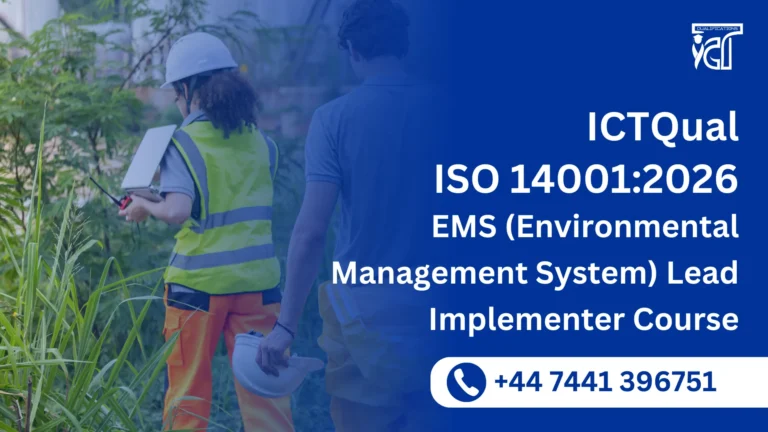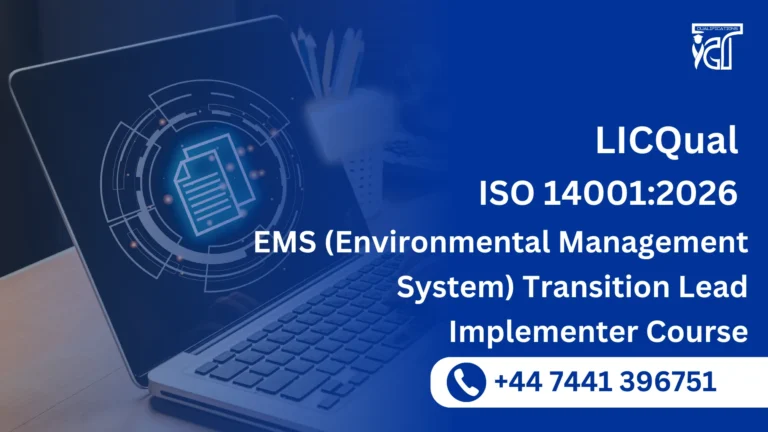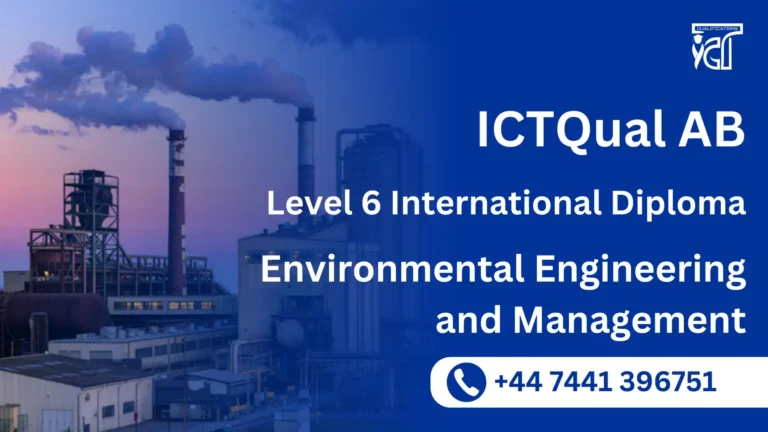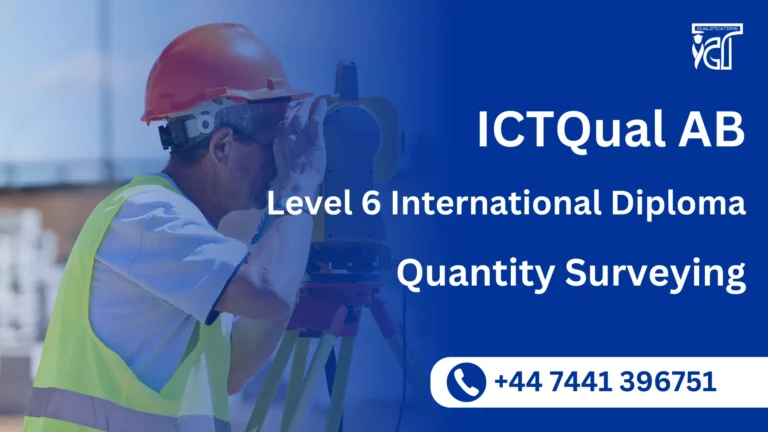The ICTQual AB Level 6 International Diploma in Petroleum Engineering is a prestigious, internationally recognized qualification designed to equip learners with advanced technical knowledge and practical skills essential for the modern oil and gas industry. Petroleum engineering plays a critical role in global energy production, resource management, and technological innovation, making this diploma highly relevant for both fresh graduates and experienced professionals seeking career advancement in the energy sector.
This comprehensive three-year program, comprising 360 credits, provides a structured pathway from foundational principles to advanced industry applications. Learners will gain expertise in drilling engineering, reservoir management, production optimization, well logging, petroleum project planning, and offshore operations. The curriculum integrates practical exercises, field simulations, and industry-standard software tools, enabling learners to translate theoretical knowledge into real-world solutions effectively.
Graduates of this program will develop critical skills in problem-solving, data analysis, project management, and operational optimization. The course emphasizes health, safety, and environmental compliance, ensuring learners are prepared to operate responsibly in complex petroleum operations. Additionally, exposure to smart technologies, automation, and Industry 4.0 applications prepares learners for the future of energy engineering and sustainable resource management.
By enrolling through our approved ICTQual AB centre, learners benefit from expert guidance, structured assessments, and access to a globally recognized Level 6 qualification. Upon completion, graduates will be fully equipped to pursue professional roles such as petroleum engineer, reservoir engineer, drilling specialist, production manager, or energy project consultant. This diploma provides the knowledge, practical skills, and professional credibility necessary to excel in national and international oil and gas industries.
ICTQual AB Level 6 International Diploma in Petroleum Engineering
This qualification, the ICTQual ABLevel 6 International Diploma in Petroleum Engineering, consists of 36 mandatory units.
Year 1 – Foundation in Petroleum Engineering
- Principles of Petroleum Engineering
- Engineering Mathematics
- Fundamentals of Mechanical and Electrical Engineering
- Introduction to Petroleum Geology
- Drilling Engineering Fundamentals
- Engineering Drawing and Computer-Aided Design (CAD)
- Basics of Reservoir Engineering
- Well Logging and Formation Evaluation
- Health, Safety, and Environmental Practices in Petroleum Engineering
- Communication and Technical Report Writing
- Introduction to Project Management in Engineering
- Introduction to Oil & Gas Industry Operations
Year 2 – Intermediate Studies in Petroleum Engineering
- Advanced Drilling and Well Control
- Reservoir Rock and Fluid Properties
- Production Engineering and Well Completion
- Petroleum Facilities and Pipeline Engineering
- Applied Thermodynamics and Fluid Mechanics
- Petroleum Project Planning and Management
- Oil & Gas Exploration Techniques
- Enhanced Oil Recovery Methods
- Industrial Maintenance and Reliability in Petroleum Operations
- Applied Research Methods in Petroleum Engineering
- Sustainable Practices and Environmental Management in Petroleum
- Oil and Gas Economics and Cost Control
Year 3 – Advanced Studies in Petroleum Engineering
- Advanced Reservoir Simulation and Modelling
- Petroleum Production Systems and Optimisation
- Offshore and Subsea Engineering
- Advanced Drilling Technology and Well Intervention
- Advanced Fluid Flow and Multiphase Systems
- Petroleum Safety, Risk, and Quality Management
- Smart Technologies and Industry 4.0 in Oil & Gas
- Robotics and Automation in Petroleum Operations
- Cyber-Physical Systems and IoT in Petroleum Engineering
- Professional Ethics and Sustainability in Petroleum Engineering
- Innovation and Entrepreneurship in Oil & Gas Technology
- Final Year Major Project (Capstone Project)
Learning Outcomes for the ICTQual ABLevel 6 International Diploma in Petroleum Engineering:
The ICTQual AB Level 6 International Diploma in Petroleum Engineering equips learners with advanced technical knowledge, practical expertise, and strategic skills necessary for a successful career in the oil and gas industry. Graduates will develop competencies in exploration, drilling, production, reservoir management, and sustainable petroleum operations, ensuring readiness for professional and leadership roles globally.
Year 1 – Foundation in Petroleum Engineering
Principles of Petroleum Engineering
- Understand the fundamental concepts of petroleum exploration, drilling, and production
- Apply engineering principles to real-world petroleum operations
- Analyze industry workflows to improve operational efficiency
Engineering Mathematics
- Apply calculus, algebra, and statistics to solve petroleum engineering problems
- Develop quantitative skills for modeling and analysis of oilfield systems
- Use mathematical tools to optimize engineering decision-making
Fundamentals of Mechanical and Electrical Engineering
- Understand mechanical and electrical systems in petroleum operations
- Apply engineering principles to troubleshoot and maintain equipment
- Analyze system performance to enhance operational efficiency
Introduction to Petroleum Geology
- Understand geological formations, rock types, and reservoir structures
- Interpret geological data to support exploration and drilling decisions
- Apply geoscience knowledge to reservoir evaluation
Drilling Engineering Fundamentals
- Learn basic drilling techniques and well design principles
- Apply drilling concepts to ensure operational safety and efficiency
- Evaluate drilling data for decision-making
Engineering Drawing and Computer-Aided Design (CAD)
- Create technical drawings for petroleum engineering projects
- Use CAD tools to design wells, pipelines, and facilities
- Interpret diagrams for project planning and implementation
Basics of Reservoir Engineering
- Understand reservoir behavior, pressure, and fluid dynamics
- Apply reservoir modeling techniques to predict production performance
- Analyze reservoir data for informed decision-making
Well Logging and Formation Evaluation
- Interpret well logs and formation data for reservoir characterization
- Apply evaluation techniques to optimize well placement
- Support production strategies using data-driven insights
Health, Safety, and Environmental Practices in Petroleum Engineering
- Implement safety protocols and risk assessments in petroleum operations
- Promote environmentally responsible practices in oil and gas projects
- Ensure compliance with industry standards and regulations
Communication and Technical Report Writing
- Develop professional writing and presentation skills for technical documentation
- Prepare comprehensive reports on field studies, projects, and analyses
- Communicate effectively with teams and stakeholders
Introduction to Project Management in Engineering
- Understand project planning, scheduling, and resource allocation
- Apply project management techniques to petroleum operations
- Monitor project performance for timely delivery
Introduction to Oil & Gas Industry Operations
- Gain insights into upstream, midstream, and downstream operations
- Understand operational workflows and industry best practices
- Evaluate roles and responsibilities within the oil and gas sector
Year 2 – Intermediate Studies in Petroleum Engineering
Advanced Drilling and Well Control
- Apply advanced drilling techniques and well control measures
- Ensure operational safety and efficiency in complex wells
- Analyze drilling performance data to optimize operations
Reservoir Rock and Fluid Properties
- Evaluate petrophysical characteristics of reservoir rocks and fluids
- Apply data to predict reservoir performance and production potential
- Use laboratory and field analysis for operational decision-making
Production Engineering and Well Completion
- Design and optimize well completions for maximum production
- Apply production engineering principles to surface and subsurface systems
- Analyze production data to improve operational efficiency
Petroleum Facilities and Pipeline Engineering
- Understand the design, operation, and maintenance of pipelines and facilities
- Apply engineering principles to transportation, storage, and distribution systems
- Monitor system performance for safety and efficiency
Applied Thermodynamics and Fluid Mechanics
- Apply thermodynamic and fluid mechanics principles to oil and gas systems
- Analyze pressure, temperature, and flow in wells and pipelines
- Optimize engineering solutions using quantitative analysis
Petroleum Project Planning and Management
- Plan and manage petroleum projects from concept to execution
- Apply budgeting, scheduling, and risk assessment techniques
- Evaluate project outcomes for continuous improvement
Oil & Gas Exploration Techniques
- Understand seismic, geophysical, and geochemical exploration methods
- Interpret exploration data to locate and evaluate reservoirs
- Apply exploration insights to support drilling decisions
Enhanced Oil Recovery Methods
- Learn chemical, thermal, and gas injection methods for improved recovery
- Apply enhanced oil recovery techniques to maximize production
- Evaluate efficiency and cost-effectiveness of recovery methods
Industrial Maintenance and Reliability in Petroleum Operations
- Implement maintenance strategies to ensure equipment reliability
- Monitor system performance and prevent downtime
- Apply reliability engineering principles to facilities and operations
Applied Research Methods in Petroleum Engineering
- Conduct research using quantitative and qualitative methods
- Analyze data to address practical engineering problems
- Prepare and present technical research reports
Sustainable Practices and Environmental Management in Petroleum
- Implement sustainable operations and environmental protection measures
- Monitor compliance with industry regulations
- Develop strategies to minimize ecological impact
Oil and Gas Economics and Cost Control
- Understand financial principles, cost analysis, and budgeting in petroleum projects
- Apply economic evaluation to optimize investment and operational decisions
- Monitor financial performance of projects and operations
Year 3 – Advanced Studies in Petroleum Engineering
Advanced Reservoir Simulation and Modelling
- Use simulation tools to model reservoir behavior and predict production
- Apply modeling insights to optimize recovery strategies
- Analyze simulation results for decision-making
Petroleum Production Systems and Optimisation
- Design and manage production systems for efficiency and reliability
- Apply optimization techniques to wells, pipelines, and surface facilities
- Evaluate operational performance and implement improvements
Offshore and Subsea Engineering
- Understand offshore platform and subsea system design
- Apply engineering principles for deepwater operations
- Ensure safety and operational efficiency in offshore projects
Advanced Drilling Technology and Well Intervention
- Utilize advanced drilling technologies and intervention methods
- Plan and execute safe and efficient well operations
- Analyze performance data for continuous improvement
Advanced Fluid Flow and Multiphase Systems
- Study multiphase flow dynamics in wells and pipelines
- Apply engineering principles to solve complex fluid flow problems
- Optimize system performance using quantitative analysis
Petroleum Safety, Risk, and Quality Management
- Implement safety and quality management systems
- Conduct risk assessments and enforce compliance with standards
- Promote a culture of safety and operational excellence
Smart Technologies and Industry 4.0 in Oil & Gas
- Apply digital and smart technologies to optimize operations
- Use IoT, sensors, and automation for real-time monitoring
- Evaluate technology effectiveness for operational improvements
Robotics and Automation in Petroleum Operations
- Integrate robotics and automated systems in drilling and production
- Improve efficiency, precision, and safety through automation
- Maintain and monitor automated operations effectively
Cyber-Physical Systems and IoT in Petroleum Engineering
- Implement IoT solutions for monitoring and controlling systems
- Analyze real-time data for predictive maintenance and decision-making
- Enhance operational efficiency using cyber-physical integration
Professional Ethics and Sustainability in Petroleum Engineering
- Apply ethical principles in professional decision-making
- Promote sustainability and environmentally responsible practices
- Align operations with industry standards and social responsibility
Innovation and Entrepreneurship in Oil & Gas Technology
- Develop innovative solutions for petroleum engineering challenges
- Apply entrepreneurial thinking to projects and business ventures
- Assess feasibility and impact of technological innovations
Final Year Major Project (Capstone Project)
- Conduct a comprehensive project integrating theoretical and practical knowledge
- Demonstrate advanced problem-solving, research, and technical skills
- Present findings professionally, showcasing readiness for industry roles
The ICTQual AB Level 6 International Diploma in Petroleum Engineering equips learners with advanced technical knowledge, practical skills, and professional credibility, preparing them for successful careers in the global oil and gas industry.
1. Global Recognition
- Earn a Level 6 qualification that is respected internationally in the oil and gas sector
- Enhance employability in national and multinational petroleum companies
- Gain credentials recognized by professional bodies and industry organizations
2. Advanced Technical Expertise
- Develop in-depth knowledge of drilling, reservoir engineering, and production optimization
- Understand well logging, formation evaluation, and offshore/subsea operations
- Acquire skills in advanced fluid mechanics, thermodynamics, and petroleum system analysis
3. Practical Industry Skills
- Apply hands-on techniques through field exercises, laboratory work, and simulation tools
- Gain experience in project-based learning and real-world engineering challenges
- Develop problem-solving and analytical skills applicable to petroleum operations
4. Career Advancement
- Prepare for professional roles such as petroleum engineer, reservoir engineer, production manager, and drilling specialist
- Access leadership and technical consultancy opportunities within the energy sector
- Build a strong foundation for career progression in global oil and gas industries
5. Project Management and Leadership
- Learn project planning, scheduling, and resource allocation techniques
- Develop leadership and team management skills for complex petroleum projects
- Apply risk assessment and decision-making strategies in operational planning
6. Safety and Environmental Compliance
- Understand health, safety, and risk management protocols in petroleum operations
- Apply sustainable practices to minimize environmental impact
- Ensure adherence to international safety and environmental standards
7. Innovation and Technology Integration
- Gain exposure to Industry 4.0 technologies, including IoT, automation, and smart systems
- Implement digital tools to optimize operations and improve efficiency
- Learn to integrate advanced technologies for innovative solutions
8. Entrepreneurial Opportunities
- Develop skills in innovation and entrepreneurship for the energy sector
- Learn to assess feasibility and implement new technologies or business ventures
- Enhance strategic thinking for problem-solving and operational improvement
9. Comprehensive Learning Path
- Complete a structured 3-year, 360-credit program from foundational to advanced topics
- Gain expertise across drilling, production, project management, and sustainable practices
- Build a strong portfolio demonstrating technical competence and industry readiness
This diploma provides learners with the knowledge, skills, and professional credibility required to excel in the petroleum industry, ensuring readiness for leadership, innovation, and sustainable practices in global energy engineering.
This diploma is designed for learners who aspire to acquire advanced technical knowledge, practical skills, and professional expertise in petroleum engineering. It caters to both fresh graduates and experienced professionals seeking career advancement in the oil and gas industry.
1. Academic Background and Interests
- Recent school or college graduates with strong foundations in mathematics, physics, chemistry, or engineering-related subjects
- Individuals passionate about energy technology, oilfield operations, and industrial engineering
- Learners interested in petroleum exploration, drilling, production, and reservoir management
2. Professional Aspirations
- Professionals aiming to advance careers in petroleum engineering, oilfield operations, drilling, or energy project management
- Candidates targeting roles in reservoir engineering, production optimization, facility management, or offshore operations
- Learners seeking leadership, consultancy, or entrepreneurial opportunities in the energy sector
3. Skills and Competencies
- Desire to develop hands-on skills in drilling engineering, reservoir modeling, well logging, and production systems
- Interest in applying advanced digital, automation, and IoT technologies in oil and gas operations
- Commitment to learning safety protocols, environmental management, and sustainable petroleum practices
4. Personal Attributes
- Strong motivation to innovate and implement engineering solutions in real-world petroleum projects
- Ability to work independently and collaboratively on complex technical projects
- Willingness to embrace continuous learning, professional ethics, and international industry standards
This program is ideal for learners committed to developing comprehensive expertise in petroleum engineering, gaining practical experience, and preparing for professional and leadership roles in the global oil and gas industry.
The ICTQual AB Level 6 International Diploma in Petroleum Engineering provides a strong foundation for learners to advance in both academic and professional pathways. Graduates gain the technical expertise, practical skills, and industry recognition required to pursue higher-level roles and further studies in the energy sector.
1. Professional Career Progression
- Advance to senior roles such as senior petroleum engineer, reservoir manager, production manager, or drilling supervisor
- Qualify for leadership positions in offshore operations, upstream production, and energy project management
- Opportunities to work in national and multinational oil and gas companies, energy consultancies, and industrial engineering firms
2. Further Academic Progression
- Progress to master’s degree programs in petroleum engineering, energy engineering, or related fields
- Eligible for postgraduate research and specialized certifications in advanced drilling, reservoir modeling, and sustainable energy technologies
- Opportunity to engage in applied research projects and technical innovation in the petroleum and energy sector
3. Entrepreneurial and Consultancy Opportunities
- Start own consultancy or energy solutions business focusing on petroleum operations, smart technologies, or sustainability
- Develop and implement innovative technologies and automation solutions for the oil and gas industry
- Explore opportunities in energy project planning, risk management, and operational optimization
4. Professional Career Progression
- Advance to senior roles such as senior petroleum engineer, reservoir manager, production manager, or drilling supervisor
- Qualify for leadership positions in offshore operations, upstream production, and energy project management
- Opportunities to work in national and multinational oil and gas companies, energy consultancies, and industrial engineering firms
- Access specialized roles in petroleum technology, reservoir simulation, and production optimization
5. International Opportunities
- Work in global oil and gas projects, offshore platforms, or multinational energy companies
- Apply industry-recognized skills in international energy markets, offshore engineering, and petroleum project management
- Build a career with high demand and competitive earning potential worldwide
Graduates of this diploma are well-prepared to advance in technical, managerial, and research roles within the petroleum industry, or pursue higher education and entrepreneurial opportunities, ensuring a successful and globally recognized career in energy engineering.
As an approved centre of ICTQual AB, learners must enrol with us to pursue this internationally recognized Level 6 qualification. The certification route varies based on prior professional experience.
1. Route for Experienced Professionals (Minimum 6 Years Verifiable Experience)
- Professionals with at least six years of verifiable work experience in petroleum engineering, oilfield operations, drilling, or related energy sector roles may apply through an experience-based route
- Candidates must provide documented evidence of professional experience, including employment records, project portfolios, and references
- Upon verification, learners may be exempted from completing all 36 assignments and focus on targeted assessments or a practical project submission
- This route allows experienced professionals to fast-track certification while validating their existing skills and industry expertise
2. Route for Fresh Candidates (No Prior Experience)
- Fresh graduates or individuals new to petroleum engineering are required to complete the full 3-year, 360-credit program, including all 36 assignments across the curriculum
- Learners will develop foundational, intermediate, and advanced technical skills through structured learning, practical exercises, and assessments
- Successful completion ensures compliance with ICTQual AB standards for Level 6 certification
- This route provides a comprehensive learning experience, preparing learners for professional roles in petroleum engineering, oil and gas operations, and energy project management
Entry Requirements
The ICTQual AB Level 6 International Diploma in Petroleum Engineering is designed for learners aiming to build a comprehensive career in the oil and gas sector. To ensure learners are adequately prepared for this advanced program, specific entry requirements are recommended, covering age, education, professional experience, and English language proficiency. Meeting these requirements helps learners maximize the value of the program and achieve global industry recognition.
1. Age Requirements
- Learners should be 18 years or older at the time of enrolment
- Minimum age ensures readiness for higher education and professional responsibilities
- Candidates under 18 may be considered on a case-by-case basis with parental or guardian consent
2. Educational Requirements
- Minimum requirement: High school diploma or equivalent with strong grades in mathematics, physics, or chemistry
- Preferably a background in engineering, science, or technical subjects
- Related courses: ICTQual AB Level 5 Diploma in Mechanical Engineering or Level 5 in Oil & Gas Engineering for foundational preparation
3. Professional Experience
- For experienced candidates: Minimum of 6 years of verifiable work experience in petroleum, oil and gas operations, drilling, or related engineering fields
- Fresh candidates can enrol without prior experience but must complete all 36 assignments to achieve full certification
- Documented evidence such as employment records, project reports, and references is required for experience-based enrolment
4. English Language Proficiency
- Learners must demonstrate proficiency in English, as all course materials, assessments, and communications are delivered in English
- Acceptable proof includes:
- IELTS 5.5 or higher
- TOEFL 70 or equivalent
- Evidence of prior education or work experience conducted in English
- Adequate English skills ensure effective comprehension of technical content and successful completion of assignments
Meeting the entry requirements ensures learners are fully prepared to engage with the ICTQual AB Level 6 International Diploma in Petroleum Engineering. These prerequisites support academic success, practical skill development, and readiness for a global career in the petroleum and energy industry.
Register Now
Qualification Process
Qualification Process for the ICTQual AB Level 6 International Diploma in Petroleum Engineering
- Self-Assessment:
Begin by evaluating your eligibility to ensure you meet the qualification requirements, including work experience, knowledge, and language proficiency. - Registration:
Complete your registration by submitting the required documents, including a scanned copy of a valid ID, and paying the registration fee. - Induction:
An assessor will conduct an induction to confirm your eligibility for the course and explain the evidence requirements. If you do not meet the criteria, your registration will be cancelled, and the fee will be refunded. - Assignments & Evidence Submission:
Provide all assignments and the necessary evidence based on the assessment criteria outlined in the course. If you are unsure of the required evidence, consult with the assessor for guidance on the type and nature of evidence needed. - Feedback and Revision:
The assessor will review your submitted evidence and provide feedback. Evidence that meets the criteria will be marked as “Criteria Met,” while any gaps will be identified. You will be asked to revise and resubmit if needed. - Competence Evidence:
Submit final evidence demonstrating that all learning outcomes have been met. This evidence will be marked as “Criteria Met” by the assessor once it is satisfactory. - Internal Quality Assurance (IQA):
The Internal Quality Assurance Verifier (IQA) will review your evidence to ensure consistency, quality, and compliance with standards. - External Verification:
The IQA will submit your portfolio to ICTQUAL AB External Quality Assurance Verifiers (EQA) for final confirmation. The EQA may contact you directly to verify the authenticity of your evidence. - Certification:
Upon successful completion of all checks, ICTQUAL AB will issue your official certificate, confirming that you have attained the ICTQual AB Level 6 International Diploma in Petroleum Engineering.







